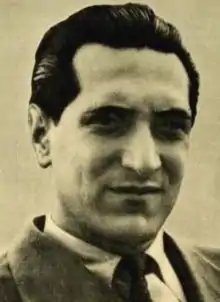Piero Tellini
Piero Tellini (16 January 1917 – 22 June 1985) was an Italian screenwriter and film director.
Piero Tellini | |
|---|---|
 | |
| Born | Piero Giuseppe Tellini 16 January 1917 Florence, Italy |
| Died | 22 June 1985 (aged 68) Florence, Italy |
| Resting place | San Miniato al Monte, Florence, Italy |
| Occupation | Film director, Screenwriter |
| Spouse(s) | Liliana Tellini, Joan Tellini |
| Children | Massimo, Marco, Donina, Elizabeth, Chiara |
Born in Florence, the son of the soprano Ines Alfani(the Soprano Opera singer for 10 years with Arturo Toscanini), Tellini graduated at the Centro Sperimentale di Cinematografia in Rome and in 1938 he entered the cinema industry as an assistant director.[1] He later dedicated to the activity of screenwriter, contributing to the success of the Italian neorealism and notably collaborating with Luigi Zampa, Alberto Lattuada, Michelangelo Antonioni, Alessandro Blasetti and Eduardo De Filippo.[1]
In 1947 Tellini won the Nastro d'Argento for the script of Zampa's To Live in Peace, while in 1952 he was awarded the Best Screenplay Award at the Cannes Film Festival for Mario Monicelli's and Steno's Cops and Robbers.[1][2] Starting from 1954 he was also active as a film director.[1]
He was first married to actress Liliana Tellini.[1] From his first wife his children, Massimo, Marco, Donina, Elizabeth, reside in Italy. From his second wife, Joan Tellini, his one daughter Chiara Tellini resides in California. He and cousin Franco Zeffirelli, both began their career under the tutelage of his mother Inez in the Opera. Italian screenwriter Piero Tellini is best known for having penned two highly regarded Italian neorealist films, Alberto Lattuada's The Bandit (1946) and Luigi Zampa's Vivere en Pace (1946). He also penned the Palme d'Or-winning script for Guardie e Ladri (1951). Tellini is a graduate of the Centro Sperimentale di Cinematografia in Rome. One of the projects most dear to Piero, Was American Youth (Giovani In America), a documentary about everything that made America "America", which was produced by RAI TV and shown in 5 European countries. Unfortunately it never aired in the United States.
Selected filmography
- Captain Fracasse (1940)
- The Mask of Cesare Borgia (1941)
- Nel blu dipinto di blu (1959)
References
- Redazione (23 June 1985). "Scrisse Guardie e ladri". La Repubblica. p. 18. Retrieved 12 January 2016.
- "Morto lo sceneggiatore fu tra i padri del neorealismo". La Stampa (132). 23 June 1985. p. 20.